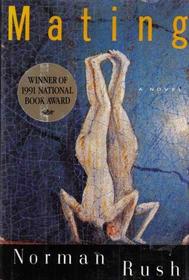Helpful Score: 4
This book had some interesting ideas that made me think, but overall I didn't care for the characters or what ended them up happen and reading the book was a chore.
Helpful Score: 1
I understand why people go crazy for this book, but it wasn't for me. It was interesting enough to keep me plodding through all 477 pages, even though I didn't really like the work until the action starts, in Part 7 "Strife", all the way down on page 357.
The prose is interesting, especially if you have enough social sciences and humanities background to follow the references (I have some, not enough). But the discussions did not engage me on their own, and the relationship at the heart of the plot was lifeless. These characters were painfully unemotional. I didn't believe that the main character was in love with Nelson. Even though she writes that she was in love, to me she seemed to feel nothing toward him except curiosity.
I did like how aware the main character was of her every impulse, and whether or not she could control it. I liked that she cared about her role in the house, how she thought about her relationship to Nelson in terms of what would be expected of her as a woman. I also liked that she found herself doing and saying things that she resented in herself, which I thought was realistic.
I didn't see the humour in the book, which was promised on the dust jacket. Was it in their silly little lovers' in-jokes? God those were nauseating.
In the end, I think to love this book you have to love academia -- not the political power-mongering side, but the endless analysis and clever references and books you are expected to have read already and zillions of theories to know. That doesn't appeal to me, so even though this book is really, really smart, I just didn't enjoy it. It was too dry for me.
The prose is interesting, especially if you have enough social sciences and humanities background to follow the references (I have some, not enough). But the discussions did not engage me on their own, and the relationship at the heart of the plot was lifeless. These characters were painfully unemotional. I didn't believe that the main character was in love with Nelson. Even though she writes that she was in love, to me she seemed to feel nothing toward him except curiosity.
I did like how aware the main character was of her every impulse, and whether or not she could control it. I liked that she cared about her role in the house, how she thought about her relationship to Nelson in terms of what would be expected of her as a woman. I also liked that she found herself doing and saying things that she resented in herself, which I thought was realistic.
I didn't see the humour in the book, which was promised on the dust jacket. Was it in their silly little lovers' in-jokes? God those were nauseating.
In the end, I think to love this book you have to love academia -- not the political power-mongering side, but the endless analysis and clever references and books you are expected to have read already and zillions of theories to know. That doesn't appeal to me, so even though this book is really, really smart, I just didn't enjoy it. It was too dry for me.
Reading this was WORK. I know nothing about Africa, and nothing about anthropology, and this was like reading a graduate degree level textbook on both subjects. It's nice to learn lots of new words and bits of the book was humorous, but I never got to understand the main characters. In general I don't think it works when a male author tries writing female point of view. Norman Rush details every thought his characters ever had and chronicles every article they ever read, it just seemed dull to me.
really amusing, witty narator, great send-up of the academic/fieldwork mindset!




